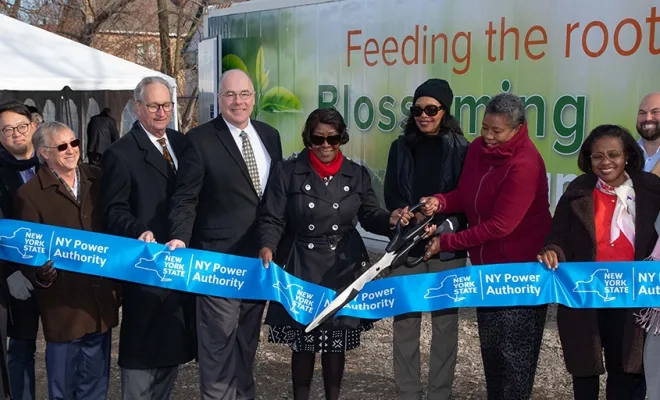
Governor Kathy Hochul today announced a new indoor food production container to advance urban farming and increase awareness about hydroponic gardening, sustainability and nutrition for underserved New Yorkers in East Buffalo. Supported by the New York Power Authority, the facility will grow vegetables and herbs year-round in an indoor environment—with no soil. Produce will be distributed to the community and the learnings from the low-energy farming methods will help New York State achieve its clean energy goals and reduce greenhouse gas emissions associated with food production.
“We remain committed to addressing food insecurity in East Buffalo and ensuring that the community has access to affordable and healthy food options including fresh fruits and vegetables,” Governor Hochul said. “Indoor food production facilities, like this one announced today, make it much easier to grow healthy food options, without soil, all year round, and right in neighborhoods that need increased access the most. I applaud the New York Power Authority, EPRI, Buffalo Go Green and our local partners for making this shipping container and farming programming available to our East Buffalo community to increase access to healthy foods.”
A branded 40-foot shipping container installed at the Buffalo Go Green’s Zenner Street urban farm was celebrated today with EPRI, NeuWater & Associates and Buffalo Center for Health Equity. NYPA’s Environmental Justice Program is collaborating with members of the Buffalo team led by NeuWater and Associates, LLC., to house, manage food production and support distribution to the community. EPRI is including the project in a nationwide research effort about the environmental impact of indoor farming.
NYPA is funding the $300,000 facility branded “Feeding the Roots. Blossoming a community” and “The power of love can grow communities,” and will be launching a slate of community engagement programs on site. Community members, with oversight and direction from Buffalo Go Green, will be able to grow healthy produce and distribute it to those in need. They will learn about hydroponic gardening and gain a broader understanding of the sustainability of local, indoor crop production, including energy and water consumption.
Buffalo Go Green provides services and training to help under-served populations in East Buffalo achieve nutritional success and move toward a sustainable future.
Rita Hubbard-Robinson, a community leader and CEO of NeuWater & Associates LLC, helped organize the effort by bringing together a unique partnership that bridges agriculture research and technology.
The Buffalo Center for Health Equity will own the container farm and offer agricultural community programs. The research aspect is particularly key in helping New York State advance the goals of the Climate Leadership and Community Protection Act (CLCPA), which require that greenhouse gas emissions be reduced by 40 percent before 2030 and 85 percent by 2050.
The project is part of NYPA’s outreach through its Environmental Justice program to underserved communities located near its statewide facilities. Additionally motivated by the Tops market tragedy in May 2022, the team committed to developing new resources and programs that meet the unique needs of East Buffalo’s community.
This is the second indoor farming project in Buffalo. The Power Authority partnered with FeedMore in 2020 and since then thousands of pounds of kale and other healthy produce has since been distributed as part of FeedMore’s nutrition program. A similar unit was opened in Harlem last year through a partnership with Harlem Grown, a youth-focused non-profit that leads urban farming and sustainability programs.
The project is part of a multi-state demonstration led by the independent, non-profit energy R&D institute EPRI to study indoor food production impacts on energy and water usage. The Buffalo facility also will look at how to increase crop yields and manage resources, while reducing water consumption and associated greenhouse gas emissions. Kale was chosen as the initial crop because of its high nutrient value and short harvest cycle.
Power Authority President and CEO Justin E. Driscoll said, “Every community should have year-round access to fresh produce. Indoor farming facilities, like the one we are celebrating today, are a great tool for addressing both nutritional and sustainability issues. The Power Authority’ is proud to be a good neighbor to underserved communities, especially one as resilient as East Buffalo, by developing energy-related programs that focus on enhancing educational equity and addressing food injustice.”
New York State Department of Agriculture and Markets Commissioner Richard Ball said, “We are committed to combatting food insecurity and indoor food production facilities, which provide innovative, sustainable opportunities to grow more fresh food directly in the communities who it most, are a critical part of that commitment. I’m grateful to Governor Hochul and our partners in helping advance this mission, ensuring that all New Yorkers can put healthy, New York food on their plates.”
Representative Brian Higgins said, “Access to healthy food is a critical component of a healthy community. This is an innovative, collaborative initiative that addresses food insecurity through environmentally friendly means and community education.”
State Senator Tim Kennedy said, “Accelerating access to fresh food and produce on East Buffalo needs to be a community-wide, all-in effort, and through this initiative, NYPA is proving to be a strong partner in bridging the gap that persists. This indoor food production unit at Buffalo Go Green Farm will serve as another opportunity for individuals to grow healthy habits by cultivating and harvesting fruits and vegetables right in their backyard.”
Assembly Majority Leader Crystal Peoples-Stokes said, “Congratulations to Buffalo Go Green on the installation of its brand new, state-of-the-art indoor hydroponic garden shipping container. We learn more each and every day about the long-term effects from pesticides sprayed on our food. The best alternative is to grow your own food, and a self-contained shipping container is your best bet. Health is wealth. Agriculture, nutrition and self-sustainability are the biggest takeaways for the community. I truly hope that area residents work with Buffalo Go Green to learn how to take advantage of this opportunity. I’d like to thank NYPA for understanding the value and importance of this project, and EPRI, NeuWater & Associates and the Buffalo Center for Health Equity for their ongoing support.”
EPRI Vice President of Electrification and Sustainable Energy Strategy David Porter said, “Indoor food production offers the ability to produce healthy produce year-round while using water and energy more efficiently. EPRI’s research helps to strengthen communities while also educating project collaborators, local stakeholders, and the next generation.”
Buffalo Go Green CEO Allison DeHonney said, “Buffalo Go Green understands the need for access to healthy food options in underserved communities in the City of Buffalo. We recognize the value of fruits and vegetables and the link between nutritional education and healthy outcomes. Our partnership with the Power Authority and the Center for Health Equity aligns with our mission and vision. Adding this indoor food production unit to farm operations is only one solution to the many issues that ail our local food system and particularly for the resilient residents in the Zenner, East Ferry neighborhood. We are excited for both the neighborhood and the city at large, which will all benefit from this project.”
Buffalo Center for Health Equity COO Allita Dockery said, “Innovative and uniquely designed, this Indoor Food Production System is strategically situated in East Buffalo and will diversify food options for area residents. The Buffalo Center for Health Equity will own the structure making this production facility Black-owned and operated. Through this initiative, the BCHE will develop additional vocational opportunities through agricultural technology to grow the breadth of our workforce development programs.”
NeuWater & Associates LLC CEO Rita Hubbard-Robinson said, “This installment of the IFP is a game changer for our community. The ability to create a sustainable answer to meet the need for produce all year round in East Buffalo has the potential to be a long-term solution. We thank NYPA, Buffalo Center for Health Equity, Buffalo Go Green, Rite Aid Healthy Futures and EPRI for their belief in innovation and ag-tech as a viable solution to address food insecurity in our northern cold climate. This is important to improve the health of our families, our seniors and our precious children.”
Environmental Justice Vice President Kaela Mainsah said, “The Power Authority is committed to providing no-cost programs and services to historically marginalized communities located near its assets. Our team offers STEM and mentorship programs for youth, brings resources to local fairs and back-to-school events, hosts weatherization workshops and supports community energy efficiency projects. Community collaboration shows our commitment to sustainability.”
New York State’s Nation-Leading Climate Plan
New York State’s nation-leading climate agenda calls for an orderly and just transition that creates family-sustaining jobs, continues to foster a green economy across all sectors and ensures that at least 35 percent, with a goal of 40 percent, of the benefits of clean energy investments are directed to disadvantaged communities. Guided by some of the nation’s most aggressive climate and clean energy initiatives, New York is on a path to achieving a zero-emission electricity sector by 2040, including 70 percent renewable energy generation by 2030, and economywide carbon neutrality by mid-century. A cornerstone of this transition is New York’s unprecedented clean energy investments, including more than $55 billion in 145 large-scale renewable and transmission projects across the state, $6.8 billion to reduce building emissions, $3.3 billion to scale up solar, more than $1 billion for clean transportation initiatives, and over $2 billion in NY Green Bank commitments. These and other investments are supporting more than 165,000 jobs in New York’s clean energy sector in 2021 and over 3,000 percent growth in the distributed solar sector since 2011. To reduce greenhouse gas emissions and improve air quality, New York also adopted zero-emission vehicle regulations, including requiring all new passenger cars and light-duty trucks sold in the State be zero emission by 2035. Partnerships are continuing to advance New York’s climate action with nearly 400 registered and more than 100 certified Climate Smart Communities, nearly 500 Clean Energy Communities, and the State’s largest community air monitoring initiative in 10 disadvantaged communities across the state to help target air pollution and combat climate change.


